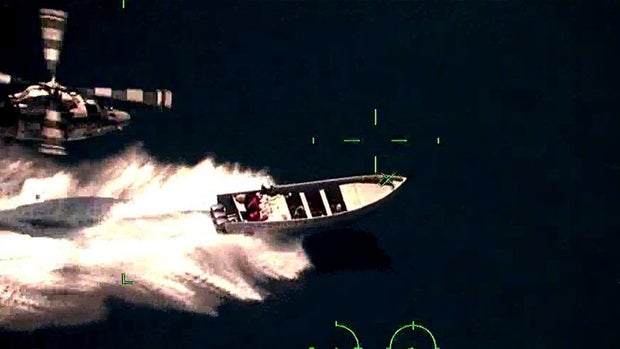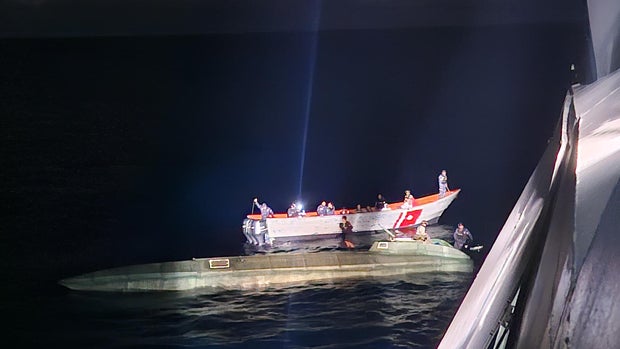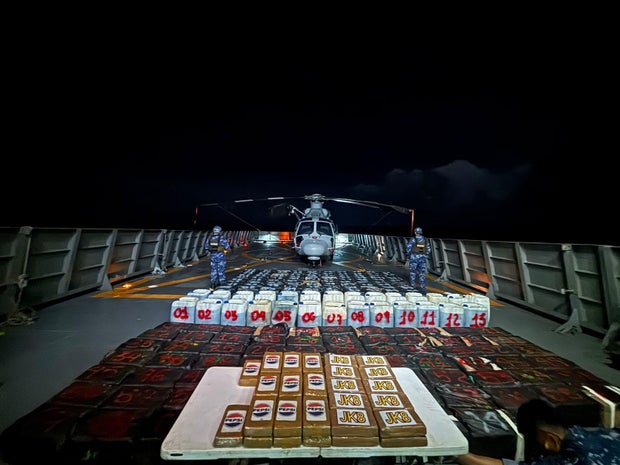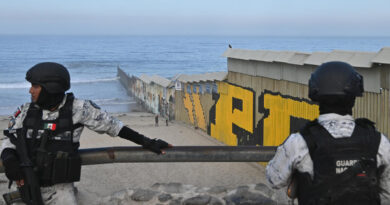Record 8.3 tons of drugs seized from “narco sub” and convoy of other boats in Pacific Ocean off Mexico
The Mexican navy announced Friday it had seized more than 8.3 tons of drugs in the Pacific Ocean, a record for a single operation at sea. The illicit cargo was intercepted from six different vessels, including a semisubmersible “narco sub” that held about 4,800 pounds of narcotics, officials said.
“Navy personnel seized 8,361 kilograms of illicit cargo, which represents the largest amount of drugs seized in a maritime operation, unprecedented in history,” the Ministry of the Navy said in a news release.
It did not specify the type of the drugs, but said they were valued at 2.099 billion pesos (about $105 million).
Twenty-three people were arrested during the bust which took place southwest of the port of Lazaro Cardenas, off the western coast of Mexico.
Mexican Navy
The drugs were distributed in six small boats and one of the vessels was a semisubmersible — commonly known as a “narco sub” — which officials said required a “complex” action on the part of the sailors.
“The strategy and high level of training of the naval personnel allowed an aerial insertion from a helicopter onto said vessel in full motion, a high-risk maneuver since it requires absolute mastery of boarding techniques in extreme conditions,” the navy said.
Semi-submersibles, which cannot go fully underwater, are popular among international drug traffickers as they can sometimes elude detection by law enforcement.
The navy released more than a dozen images of the operation, showing the “narco sub” as well as hundreds of packages of alleged drugs, including some emblazoned with the Pepsi logo and others marked “JK8.”
Mexican Navy
The largest drug seizure in Mexico’s history was 23 tons of Colombian cocaine in November 2007.
Mexico has for decades been the hub of drug trafficking to the United States, with a large number of cartels fighting for control of the trade.
The state of Michoacan, off the coast of which the seizure took place, is the scene of clashes between criminal gangs, including the powerful Jalisco Nueva Generacion cartel, one of Mexico’s most powerful and violent criminal groups.
The latest raid reported on Friday was carried out “days ago” by surface units backed by a helicopter, the ministry said.
Some 8,700 liters of fuel, another of the illicit trades controlled by drug cartels, were also found on the raided vessels.
Mexican Navy
On August 23, authorities reported they had impounded about seven tonnes of drugs in two separate operations in the same area of the country.
The Mexican navy, which conducts surveillance operations on a permanent basis, has discovered all kinds of drug shipments, including one of cocaine stuffed in 217 barrels of chili sauce in 2016. Earlier this year, the navy seized more than seven tons of suspected cocaine in two separate raids in the Pacific Ocean, and dramatic video captured the high-speed chases on the open sea.
Mexico has for decades been a drug trafficking route to the United States, which has sparked disputes between different narco groups.
The country’s first woman president Claudia Sheinbaum, who took office on October 1, faces a major challenge to tackle the drug cartels and related crimes.
She has pledged to stick with her predecessor Andres Manuel Lopez Obrador’s “hugs not bullets” strategy of using social policy to tackle crime at its roots.
Across Mexico, more than 450,000 people have been killed and tens of thousands have gone missing in a spiral of violence since the government deployed the army to combat drug trafficking in 2006.






